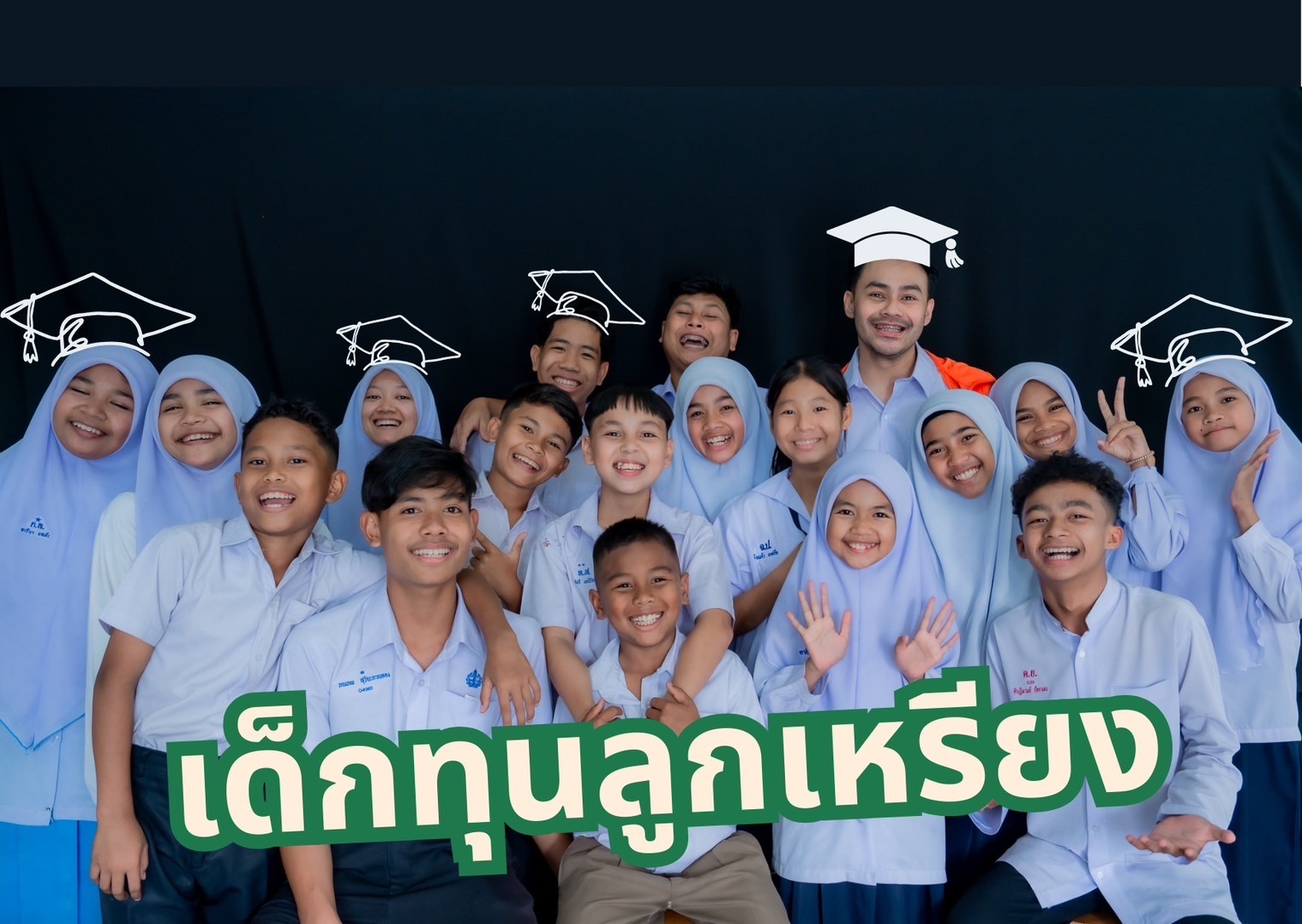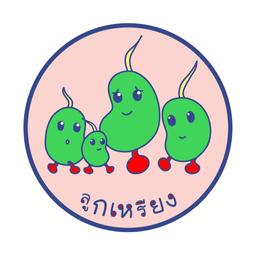life hero 2025-Scholarship for “luukrieang” (Southern Border Youth)
Donations for the project will gives educational opportunities and better quality of life to children and youth85persons
Period of time
Mar 4, 2025 - Mar 31, 2026Location
SDG Goals
Beneficiary groups of the project
“I want to be a nurse. Because I want to take care of my father. I want to help others who suffer like my father did.”
A story is told: the father of “Nong Areefa” used to be strong, working and caring for the family. One day, while returning home from work, he was injured by an explosion in the unrest in the three southern border provinces. Since then he has been unable to walk.
From that moment on, Areefa had to care for her father, watching him struggle to live until his last breath. She began to dream:
“I know how painful it is to see someone you love suffering and not be able to help. I want to become a nurse so I can help others who face hardship like that.”
The Association of Children and Youth for Peace in the Southern Border (luukrieang) has been supporting children affected by unrest in the three provinces for over 16 years, to help them return to normal life and grow to become peace-builders. Currently, more than 48 children who graduated through the program hold jobs in desired professions such as teachers, social development officers, nurses, chefs, police, etc. They have seen the children begin to smile again, laugh, re-socialize. When these youth grow into various professions, they become important forces to rebuild society in the border areas, and a strength to lead to a better tomorrow.
When you help one child, you’re not just shaping one life — you are shaping the future of a community and society.
Social issues
The children and youth affected by violence in the southern border provinces or orphaned face deep-rooted problems in family, society, the economy, and security. These affect many children in the region:
-
Long-standing unrest: Over decades, violence has caused many deaths and injuries, leaving children without one or both parents. This has psychological impacts and also causes the children to lack support and opportunities for education.
-
Poverty and educational exclusion: Poverty in the southern border region is higher than national average. Many families have inadequate income even for basic needs. If parents die or become disabled through violence, children sometimes drop out of school to support the family. Education becomes out of reach even if the children have ability and ambition.
-
Psychological trauma and lack of support systems: Growing up surrounded by violence and loss, many children face mental health issues (depression, stress, loneliness). Without robust therapeutic support, they have little chance to heal or advance. Education and capacity development are not just for learning, but part of the psychological recovery process.
-
Lack of sufficient funding and support: Even though scholarship projects exist for orphans and affected children, the number of scholarships is still insufficient. Many deserving children miss out. There is also a shortage of personnel and resources to support all children comprehensively.
-
Lack of sustainable development pathways: Scholarships alone are not enough. Children need life skills training, career guidance, and job opportunities after graduation. Without these, some may graduate but be unable to find employment or put their talents to use.
Therefore, to address these issues, capacity development and scholarships must be supported continuously — not only to help children stay in school, but to build a supportive system so they can have stable futures.
Approaches to addressing issues
1.Use a holistic development approach (not just giving scholarships) to support education, psychological recovery, life skills, and future opportunities. Sustained scholarships: For orphans and directly affected children, from primary through tertiary levels; cover costs like school supplies, travel, accommodation if they must study away from home. Psychological healing: Provide therapy activities (art therapy, music therapy, camps), counseling, and psychological support. Encourage peer mentoring (children who have been helped serve as mentors). Life skills & career guidance: Training in money management, social/communication skills, vocational training, internships and job placement in cooperation with public/private sectors. Community engagement & network building: Build networks among children, parents, communities; recruit volunteers to mentor; campaign to build public understanding of the issues facing children in conflict zones.
2.Expected outcomes: Children get real educational opportunities, even if they once had to drop out, and may graduate to meaningful jobs. More than 48 graduates already have careers in professions they dreamed of. Psychological healing helps children regain strength: many who once had depression or stress find hope and are able to re-establish social relations, reducing risks of being drawn into violent groups. Children gain life skills and can support themselves; some help their families, improving living standards. Alumni become mentors to younger children, creating a sustaining network.
3.Differentiation & uniqueness from other organizations: Emphasis on psychological healing along with education (many groups only give scholarships) Long-term support rather than one-time grants Peer mentoring & community networks for continuous, sustainable assistance
Operational Plan
Planning & counseling: Life planning and career guidance for each child, aligning education to future opportunity
Scholarship support: Cover annual educational costs
Sustain, follow up & care: Counseling, visits, psychological support, life supervision, and storytelling to inspire others and build morale
Budget Plan
| Item | Quantity | Amount (THB) |
|---|---|---|
| Primary school Scholarship 22,000 / person / year | 16persons | 352,000.00 |
| Lower secondary Scholarship 28,000 / person / year | 24persons | 672,000.00 |
| Upper secondary & Vocational Certificate Scholarship 33,000 / person / year | 25persons | 825,000.00 |
| Tertiary / Higher education & Vocational Diploma Scholarship 35,000 / person / year | 20persons | 700,000.00 |
| Total Amount | 2,549,000.00 | |
| Taejai support fee (10%) | 254,900.00 | |
Project manager
“ลูกเหรียง” สมาคมเด็กและเยาวชนเพื่อสันติภาพชายแดนใต้ ปี 2547 ลูกเหรียง เติบโตภายใต้การรวมตัวของเด็กและเยาวชนที่สูญเสียบุคคลผู้เป็นที่รักในครอบครัว รวมตัวกันเพื่อเยียวยาและดูแลตัวเองจนเข้มแข็ง ครั้งหนึ่ง “เราคือกับระเบิดในอนาคต” กับระเบิดที่รอวันเติบโตและระเบิดออกมา แต่.....จะเป็นอย่างไร ถ้าเราปล่อยให้บ้านของเรามีกับระเบิดที่รอวันระเบิดอยู่เต็มไปหมดในพื้นที่ชายแดนใต้ จะเป็นอย่างไร ถ้าเราปล่อยให้เด็กคนหนึ่งเติบโตด้วยความรู้เจ็บปวด เจ็บแค้น ครั้งนี้เราจึงต้องลุกขึ้นมาหยุดความรู้สึกเจ็บปวด ความรู้สึกแค้น เปลี่ยนเป็นพลังที่จะช่วยเยียวยา ดับไฟความแค้นด้วยการให้อภัย ท้าทาย แต่ทุกอย่างกล้าก้าวข้าม และเสียสละ ด้วยความตระหนักในโอกาสที่เราได้รับตลอดมา สร้างแรงบันดาลใจในการลุกขึ้นมาทำงานตอบแทนสังคม ด้วยความหวังว่ามือเล็กๆที่กำลังเติบโตเป็นผู้ใหญ่ ใจเล็กๆแต่ยิ่งใหญ่ด้วยความศรัทธา เชื่อมั่น สักวันหนึ่งจะสามารถสร้างการเปลี่ยนแปลงในพื้นที่ชายแดนใต้ได้อย่างยั่งยืน จากจุดเริ่มต้นดังกล่าว ลูกเหรียงเห็นความสำคัญของการทำงานในประเด็นเรื่องการปกป้องคุ้มครอง ช่วยเหลือเยียวยา และส่งเสริมพัฒนา ในกลุ่มเป้าหมายที่เป็นเด็กและเยาวชนในพื้นที่ 3 จังหวัดชายแดนภาคใต้ เพื่อให้เด็กและเยาวชนทุกคนได้รับความช่วยเหลือ พัฒนาให้เด็กและเยาวชนเหล่านี้ เติบโตขึ้นเป็นกำลังสำคัญในการพัฒนาสังคมและสร้างสันติสุขให้เกิดขึ้นในจังหวัดชายแดนภาคใต้สืบไป กลุ่มลูกเหรียงเน้นในการทำกับเด็กเปราะบาง โดยยึดหลักการให้เยาวชนอยู่กับครอบครัว และให้การสนับสนุนด้านต่าง ๆ เช่น ทุนการศึกษา เสื้อผ้า รวมไปถึงอาชีพของผู้ปกครองเด็ก นอกจากนี้ลูกเหรียงยังมีบ้านพักชั่วคราวกึ่งถาวรสำหรับเด็กและสตรีที่ได้รับผลกระทบจากความรุนแรง ที่ไม่มีครอบครัวที่พึ่งพา กลุ่มลูกเหรียง ดำเนินงานใน 4 ประเด็นหลัก 1. ด้านการปกป้องคุ้มครอง 2. ด้านการช่วยเหลือเยียวยา 3. ด้านส่งเสริมพัฒนา 4. กิจการเพื่อสังคม ในกลุ่มเป้าหมายเด็ก เยาวชน ผู้หญิง และกลุ่มเป้าหมายเปราะบางอื่น ๆ ในพื้นที่ชายจังหวัดชายแดนภาคใต้ เพื่อให้กลุ่มเป้าหมายทุกคน ได้รับความช่วยเหลือ ได้รับการพัฒนารอบด้าน เพื่อให้เติบโตเป็นกำลังสำคัญในการพัฒนาสังคมต่อไป
View ProfileCreate a fundraising page
Collaborate to fundraise in support of this project
Create a fundraising page
